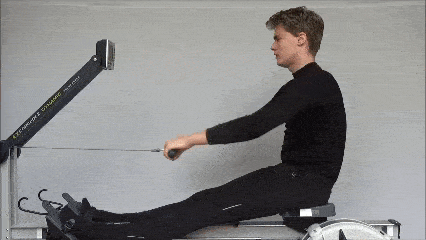|
|
Finish – Washing out |
| Mistake: | The rower moves the handle(s) to the hips in the last part of the draw, causing the blade to gradually lift out of the water. Also see:  Finish. Finish. |
| Observe: | Handle: watch the handle(s) being pulled down to the hips. Blade: watch as the blade(s) slowly resurfaces during the draw. |
| Cause: | Wrong finish hand height or compensation for too little strength in the arms. |
| Conse- quence: |
Loss of pressure at the end of the draw, causing the boat lose speed. This mistake is part of the  Sliding stroke. Sliding stroke. |
| Remedy bin: |
The oar(s) should not be pulled up from a top grip, but pushed up from the shoulders with a bottom grip. Have the rower do this to throat height (overcompensation) so that the blade(s) deeply submerge. This makes him feel the principle. The coach/instructor kneels next to the rower and assists by guiding the handle(s) to the chest (motion guidance). |
| Remedy boat: |
 Differential approach with first Differential approach with first  Practice finish hand height followed by Practice finish hand height followed by  Practice finish hand depth. Alternatively, the exercise Practice finish hand depth. Alternatively, the exercise  Chopping finish is very effective. Consistently on the water Chopping finish is very effective. Consistently on the water  Getting ready at the finish, with the blades fully covered and the boat level. For a transfer (see: Getting ready at the finish, with the blades fully covered and the boat level. For a transfer (see:  Motor coaching), ask the rower to perform a Motor coaching), ask the rower to perform a  J-stroke and bring the handle(s) in lying " J-stroke and bring the handle(s) in lying " Drifting strokes. Drifting strokes. |
| Feed- back: |
Visually: by looking at the blade. Periodically touching a specific spot on the chest with the stretched thumbs. If the chest is hit below this spot, you are washing out. |
| Cox chair: |
The top part of blade is clearly visible during the last part of the draw. The blade is therefore not kept under water until the last moment. |

Washing out (red) compared to a push out (blue) (www.rowanimation.nl).

Washing out
 |
General – Incorrect oarlock height |
 |
Finish – Blade turn out |
This article was translated automatically and is provided to you for free. You are most welcome to improve it!











